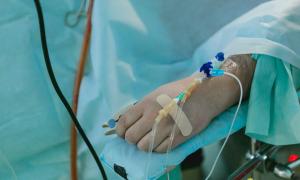Study shows that adding a new antiviral to current COVID-19 treatment could reduce mortality in hospitalised patients by 30%

IrsiCaixa principal investigator Roger Paredes leads a national study that shows that incorporating the monoclonal antibody tixagevimab/cilgavimab into the current treatment regimen for COVID-19 would reduce mortality in patients in severe stages of the disease prior to admission to the ICU
Mortality from COVID-19 among people requiring hospitalisation remains high, despite continued improvement in clinical care and treatment of the disease.
Now, an international study published in The Lancet Respiratory Medicine journal identifies a new strategy to further reduce this mortality. It involves adding the monoclonal antibody tixagevimab/cilgavimab to the standard treatment with remdesivir and dexamethasone already administered in hospitals. This phase 3 clinical trial, conducted in hospitalised patients with varying severity but not requiring ICU, has shown that this strategy is safe and, although it does not shorten the recovery period of patients, it does reduce mortality by 30%, especially in the most severely ill patients.
Roger Paredes, head of the Infectious Diseases Service at Germans Trias i Pujol Hospital and principal investigator at the IrsiCaixa AIDS Research Institute, is one of the first three authors of the paper. Paredes is the coordinator in Spain of the platform of clinical trials of patients hospitalised by COVID-19 called ACTIV-3: Therapeutics for Inpatients With COVID-19 (TICO), funded by the National Institutes of Health (NIH) in the USA. This platform involves hospitals from all over the world, including five from Catalonia (Hospital Germans Trias, Hospital Clínic, Hospital Arnau de Vilanova, Hospital del Mar, and Hospital Vall d'Hebron) and three from Madrid (Hospital Gregorio Marañón, Hospital La Paz and Hospital Clínico San Carlos).
Specifically, the trial evaluated the potential of a single intravenous dose of this antibody in people who were hospitalised, but not in the ICU, and who were also given other approved and routinely used drugs such as remdesivir or dexamethasone. This was used to assess the recovery capacity and mortality of those participating in the clinical trial. Although the results did not demonstrate a significant improvement in recovery rates, this new strategy did lead to a clinically relevant 30% reduction in mortality, particularly in more severe patients requiring higher oxygen concentrations or non-invasive mechanical ventilation. Moreover, unlike previous studies with other monoclonal antibodies that lost efficacy against omicron, which is the currently predominant variant, the tixagevimab/cilgavimab combination would maintain its ability to block this variant of the virus at the doses administered.
A global study
The study, recently completed, was conducted in about 80 centres around the world and, in Spain, involved 150 people admitted to conventional ward and semi-critical care units: 75 at Germans Trias Hospital and another 75 at other hospitals in the country. The inclusion of a large and diverse number of patients from all over the world is one of the trial's strengths, suggesting that the results would be broadly generalisable as no differences in efficacy or safety were observed according to comorbidity, immunocompromised status, or vaccination status of the patients.
The study was conducted in coordination with the Food and Drug Administration (FDA) and the European Medicines Agency (EMA), which will evaluate the possibility of this drug becoming an additional new treatment in the coming months.
"All this shows us that some monoclonal antibodies, added to the usual treatment with remdesivir and dexamethasone, could help reduce mortality from COVID-19, especially in the most severe patients. The scientific community is moving towards the use of combined antiviral treatments with the aim of stopping the virus in as many ways as possible," summarises Paredes. "This study highlights the need to continue working to achieve more rescue interventions for patients hospitalised with COVID-19", he concludes.